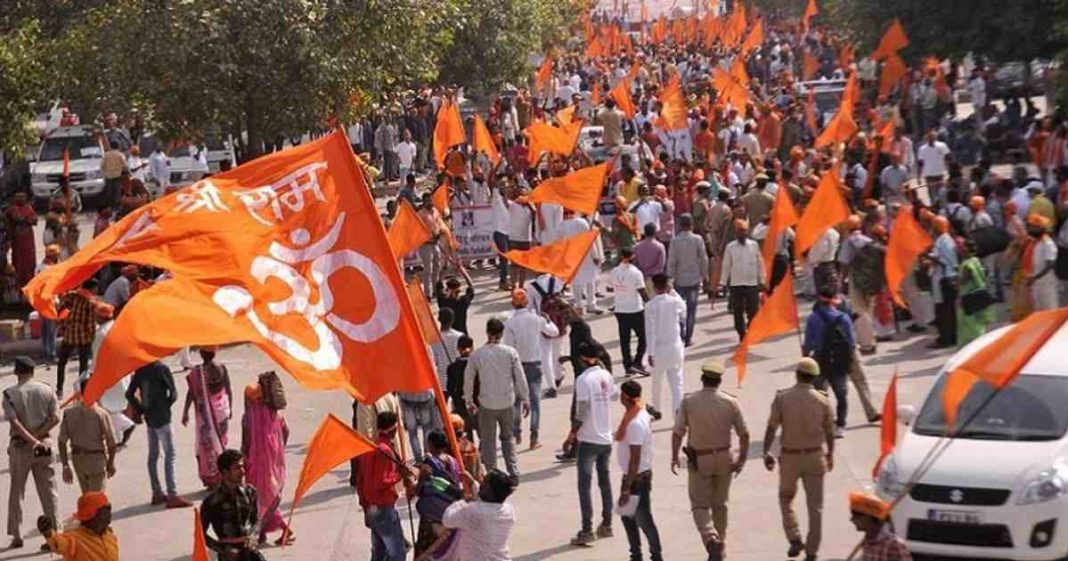Extremism in the Heart of Britain

The recent revelations from the United Kingdom’s National Police Chiefs’ Council (NPCC) paint a disturbing picture of rising extremism in the heart of British society. A damning report exposes the growing alliance between British Hindu extremists and far-right groups in the UK, revealing a calculated strategy to incite hatred against Muslims and Sikhs. These groups, emboldened by ideological support and digital outreach, are actively working to polarize communities, erode interfaith trust, and reshape the social fabric of the country.
One of the most alarming findings of the NPCC report is the manipulation of the 2019 General Elections. Extremist elements used WhatsApp and other digital platforms to influence Hindu voters, urging them to vote Conservative under the false pretense that it would pave the way for Rishi Sunak—a practicing Hindu and future Prime Minister. The attempt to engineer electoral outcomes through communal messaging represents a dangerous convergence of identity politics, religious radicalism, and disinformation campaigns.
What makes the report particularly important is its nuanced distinction between Hinduism—a diverse and ancient religion—and Hindutva, a modern, supremacist political ideology. By making this separation clear, the NPCC underscores that the issue is not with faith, but with an extremist political movement that seeks to assert Hindu dominance and build a monolithic Hindu Rashtra modeled on exclusionary principles. This political movement, Hindutva, finds its ideological roots in the Rashtriya Swayamsevak Sangh (RSS) and its affiliates, and its expansion into diaspora communities is neither accidental nor benign.
The impact of Hindutva’s rise in the UK is already being felt across British towns and cities. It is damaging interfaith relations and increasing suspicion between communities that have coexisted for generations. The traditional harmony between British Hindus, Muslims, and Sikhs is being tested by a narrative of ‘us versus them’—a false binary promoted to fracture unity and fuel sectarian strife. The UK, known for its multicultural society and religious tolerance, now faces a dangerous test of social cohesion.
Perhaps one of the most concerning aspects of this alliance is the involvement of Tommy Robinson, born Stephen Yaxley Lennon, one of Britain’s most notorious far-right agitators. His collaboration with radical Hindu groups marks a convergence of two ideologically distinct but strategically aligned forces, both feeding off Islamophobia and fear-mongering. This relationship allows them to amplify each other’s hate campaigns, drawing support from certain Indian media outlets and segments of the diaspora that have become increasingly politicized.
Even religious symbols and phrases are being weaponized in this toxic environment. “Jai Shri Ram,” once a spiritual invocation of Lord Ram in Hinduism, is now increasingly used as a slogan of intimidation against Muslims and Sikhs. Chants once heard in temples are now being shouted during street confrontations, turning what should be symbols of devotion into tools of aggression. This abuse of religious language for political gains reflects a dangerous trend where faith is distorted to justify hatred.
Cultural avenues, too, are being used to propagate Hindutva narratives. Bollywood films like Emergency—which glorify political authoritarianism and distort history to suit a narrow ideological vision—are sparking outrage beyond India’s borders. In the UK, Sikh organizations have led protests against such films, accusing them of promoting political hatred and revising historical events to vilify minorities. The cinema, once a unifying platform for the South Asian diaspora, is now becoming another battleground in a growing ideological conflict.
The NPCC report does not stop at identifying domestic threats—it goes further to accuse the Indian government of playing a strategic role in globalizing Hindutva. Through lobbying networks, diaspora proxies, and sympathetic media channels, the report outlines how New Delhi is attempting to reshape narratives abroad. These efforts are not only aimed at exporting political ideology but also at influencing foreign policy, community relations, and electoral outcomes in other democracies. The synergy between state policy and diaspora activism has created a powerful transnational network that undermines democratic norms and pluralism in host countries.
The United Kingdom must respond with clarity and resolve. Freedom of religion and belief are cornerstones of British democracy, but these freedoms cannot be used as a shield for extremism. The state has a responsibility to differentiate between legitimate cultural expression and political manipulation disguised as religious activism. Law enforcement and community leaders must work together to protect the rights of all communities while standing firm against those who seek to divide.
The British South Asian diaspora is richly diverse and largely peaceful, contributing immensely to the country’s economy, culture, and public life. It is in the collective interest of Hindus, Muslims, Sikhs, and others to resist attempts to import sectarian ideologies and reassert the shared values of coexistence, respect, and inclusion. Extremist alliances—whether rooted in the far-right or religious chauvinism—must not be allowed to hijack the identity of these communities or dictate the future of multicultural Britain.
The NPCC report is a wake-up call. It is time to recognize the danger of extremist collaborations that transcend traditional boundaries. The unity of communities, the integrity of democratic institutions, and the moral compass of religious identity are all at stake. The UK must act—not only to protect itself but to set a global example that divisive ideologies, no matter how well-disguised or widely promoted, have no place in a free and just society.











